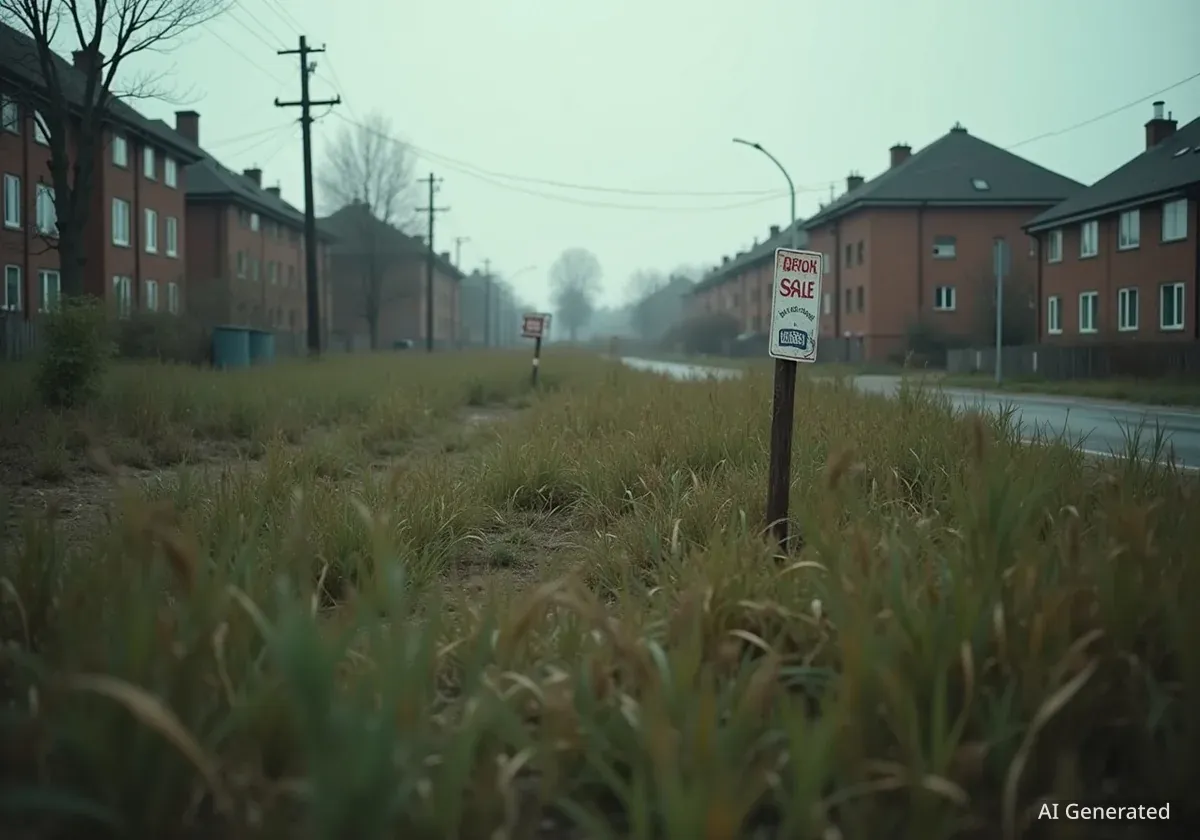An auction of roughly 800 vacant lots in Chicago, intended to settle massive debts from a real estate empire and combat urban blight, has largely failed to achieve its goals. Only one-third of the properties sold, generating a fraction of the expected revenue and leaving hundreds of neglected lots in the hands of a bankrupt estate.
The sale, which followed years of legal battles between the City of Chicago and sisters Suzie B. Wilson and Swedlana Dass, highlights the persistent challenges of revitalizing disinvested neighborhoods. Many of the unsold properties remain concentrated in the city's South and West sides.
Key Takeaways
- A bankruptcy auction sold only one-third of approximately 800 vacant lots owned by Suzie B. Wilson and Swedlana Dass.
- The sale generated about $3.4 million, significantly less than the more than $12 million anticipated.
- Over 500 lots, primarily in Chicago's South and West sides, remain unsold, leaving their future uncertain.
- The city, a primary creditor, is unlikely to recover the full $11.5 million settlement owed due to the low sales figures and other creditors.
A High-Stakes Auction with Low Returns
The auction was the result of a protracted legal fight initiated by the City of Chicago against companies owned by Wilson and Dass. City attorneys had labeled Wilson as Chicago’s “worst landowner” due to extensive neglect across her portfolio. The sisters' businesses had accumulated over $15 million in fines for violations related to overgrown weeds, garbage, and rat infestations on their properties.
Following lawsuits from the city, the network of companies filed for bankruptcy. They reached an $11.5 million settlement agreement, which included the auction of their real estate holdings to pay off creditors. The plan was designed to transfer the lots to new owners, reduce blight, and return the properties to the city's tax rolls.
Auction by the Numbers
- Parcels Offered: Roughly 800
- Parcels Sold: Approximately 275 (about one-third)
- Total Revenue: $3.4 million
- Projected Revenue: Over $12 million
- Unsold Lots: More than 500
However, the outcome fell dramatically short. An analysis of sales data and court documents shows that only about 275 of the parcels sold, bringing in just $3.4 million. This figure is a stark contrast to the more than $12 million Wilson had suggested could be raised from the top properties alone.
City's Legal Strategy and Financial Position
Despite the disappointing auction results, city officials maintain their legal pressure has been effective. Mary Richardson-Lowry, Chicago’s corporation counsel, emphasized that the primary objective was to remove the properties from the sisters' control.
“Whatever remuneration happens in the end, we have a single goal. She should no longer be in the city, owning property in a way that harms communities.”
The city has already secured over $1 million in upfront payments. However, recovering the remainder of the settlement is now complicated. Proceeds from the auction must first satisfy a loan of up to $4 million from a New York lender that financed the bankruptcy, placing the city further down the list of creditors.
Who Bought the Lots and Where?
The auction revealed clear patterns in Chicago's real estate market. Properties in areas with active development or speculation sold quickly, while lots in more economically distressed neighborhoods received little to no interest. A majority of the lots that did sell went for a modest $5,000 each.
Chicago's Vacant Land Problem
The properties owned by Wilson and Dass represent just a portion of Chicago's vacant lot inventory. As of 2023, the city itself owned over 10,000 vacant lots, with thousands more privately owned or tax-delinquent. These empty parcels are concentrated in neighborhoods that have faced decades of disinvestment.
Hotspots and Speculation
On the West Side, buyers purchased 30 out of 31 available properties in Austin and Garfield Park. Bryon Finke, a property flipper, acquired several lots as speculative investments, hoping to sell or lease them as the area develops. “I have a very grandiose vision of what [Garfield Park] could become with the right leadership,” Finke stated.
Similarly, in the South Chicago neighborhood, seven of ten lots were sold. This area is near the planned quantum computing campus on the former US Steel South Works site, making it a prime location for real estate speculation.
Neighbors and Community Investment
Some properties were purchased by neighbors who had been maintaining the vacant land for years. Cynthia Robles bought the lot next to her home for $5,000 plus closing costs. She had cared for it since a fire destroyed the previous house in the 1990s, even installing an $8,500 fence.
“It’s peace of mind because I never had that,” Robles said, expressing relief that the land is finally hers after years of uncertainty about its ownership.
In Englewood, Dwayne Herbert purchased three lots for $5,000 each. He plans to create a side yard for his apartment building and is considering developing affordable housing on the other two. “It’s more than just a money investment. It’s an investment in a movement,” Herbert explained.
The Unsold Properties and Future Challenges
The largest concentration of Wilson and Dass's properties is in Englewood and West Englewood. Of the 362 lots for sale in these two neighborhoods, fewer than 25% were sold. This lack of demand underscores a fundamental challenge: an oversupply of vacant land in areas with limited economic activity.
Daniel Kay Hertz, director of housing at the public policy group Impact for Equity, noted that the auction faced stiff competition. “She’s bringing 800 lots to sale, but there’s a lot of other people with vacant lots,” Hertz said. “The day before she put these up for auction, you could go on [Chi]BlockBuilder and find city-owned lots all over the city.”
The unsold lots are currently controlled by a bankruptcy trustee but are still technically owned by Wilson and Dass's companies. The business entities have now filed for Chapter 7 bankruptcy, which typically leads to liquidation of remaining assets. David Holtkamp, a deputy corporation counsel for the city, said he expects the properties to “go back on the market… in a process that works better for straight liquidation.”
A Relentless Pursuit
If the sisters regain control of the properties, city attorneys have vowed to continue their legal fight. Richardson-Lowry stated they would pursue them “relentlessly” for their poor stewardship of land across more than 25 city wards.
“If anyone thinks this is over, they’re not paying attention,” she warned.
For residents living near the unsold lots, the situation remains unchanged. In Englewood, an unsold lot on South Emerald Avenue is littered with debris. Another on South Sangamon Street has become a site for drug activity, according to neighbors. Lifelong resident Jacqueline Washington hopes a buyer will eventually build a home on the abandoned lot. “It will give people somewhere to go who don’t have nowhere to go,” she said.
The auction's outcome demonstrates that simply forcing the sale of neglected properties is not a complete solution. Without sufficient demand and a comprehensive strategy for redevelopment, hundreds of vacant lots in Chicago's most vulnerable communities will likely remain empty for the foreseeable future.





